Is Sushi Healthy?
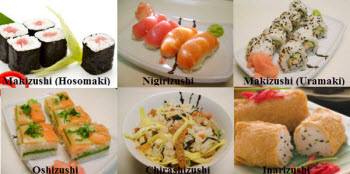
The nutritional benefits of sushi and the question of "Is Sushi Healthy for You" or not is a subject that has long been debated and one that is often on the minds of sushi lovers.
It is also something pondered by those considering sushi as an alternative food source to incorporate into their diet for better health or maybe to offset the adverse effects of eating a normal western diet which is often high in unhealthy fats (trans and saturated), red meat, processed foods and calories.
But is sushi healthy? Is it really good for you?
Well, that’s exactly what we intend to find out. And in so doing, we will try to expose it all… The Good, the Bad, and the UGLY.
So with that, let’s ask the million dollar question...
Are the Ingredients in the Sushi you are eating actually Good for You or Not? And do they have an overall positive or negative effect on answering the question, "Is Sushi Healthy for You?"
Perhaps the best way to make that determination is to take the most common ingredients used in making sushi and dissect them one by one. Tear them apart and try to discover whether they actually are or are not healthy for you.
Then, when we have reviewed them all, we will try to sum up our findings and make an overall determination as to whether we are improving our health when we eat sushi and finally answering the question of is sushi healthy or not.
Let’s begin with the most obvious dominant ingredient in this arena; and the one that is the very definition of sushi... Sushi Rice.
Sushi Rice
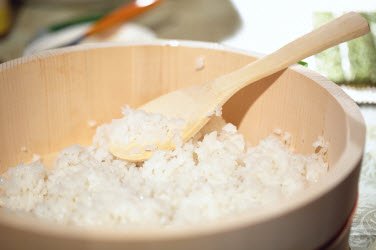
First, let’s get some definitions out of the way… like “What is sushi?”.
Well, sushi is technically “Anything that contains vinegared sushi rice”.
And since we have already established that sushi rice is the very definition of sushi, then it would also stand to reason that it would also play a big part in answering the “Is sushi healthy for you?” question too.
The pressure... is on...
The next logical question, I suppose, should be “What is sushi rice made of?”.
Well, generally it is made from a premium grade Japanese short grain white rice, water, and sushi seasoning. Sushi seasoning normally is made with rice vinegar, sugar and salt.
We will cover the rice here and the vinegar later on in this report.
Rice as a Food Source
Rice is a very important food source for most of the world. Especially in the asian countries.
To be more precise, more than half of the world's population lives on rice. That is three billion people who depend on it for over half of their daily calorie intake. And most of this rice… you guessed it... is white rice.
If rice is an unhealthy food, then a lot of people are on the same road to bad dietary health.
But that’s not what we are saying… yet.
Let’s actually start taking a look at some of the facts and see if this participant has a positive or negative influence on answering the "is sushi healthy" question.
Rice and your Health
Rice is a good source of protein (1 cup provides 25% of RDA) and carbohydrates and digests slowly, releasing its energy gradually (according to Dr. Oz ). It is also gluten free (making it an excellent choice for those with wheat allergies), is very low in saturated fat, has no cholesterol or sodium, and is high in thiamin (vitamin B1 ).
Thiamine is a co-enzyme that helps the body convert carbohydrates into energy (glucose) causing it to be burned rather than stored.
This may partially explain why people in japan, where rice is eaten at almost every meal, have an obesity rate of just 3.2% which is about 10 times LESS than it is here in the United States.
An anomaly? I think not.
So why is it that we are told to avoid white rice and that it may be "bad" for us yet the Japanese eat it all day long, have one of the longest life expectancies of any people in the world and manage to stay slim on it all at the same time?
Does something look like it doesn’t add up here? (1+1 does not = 3)
Well, part of the reason why people say white rice is “bad” is because there is a better alternative out there for you. Brown rice.
Health nuts, nutrition “gurus”, doctors, etc., they all taut it because brown rice is just plain better for you than white rice. There’s no debating that. But it’s almost too easy a way out. A cop out of sorts I think.
They talk up brown rice, but treat white rice like the red-headed step child.
Give it up people. White rice is not the nutrition demon from hell.
Calorie Count gives short grain white rice a nutritional B+. What do they give to brown rice? They give brown rice an A-.
Wow. What. a. big. difference. (Not…)
Meaning… white rice is good for you too, just not quite up there with brown rice.
So, besides that why is brown rice technically better for you than white rice?
White rice has had the hull, bran and germ removed leaving the pure central starch core. Brown rice has only had the outer hull removed leaving the bran and germ behind which is what makes it more nutritious and healthy than white rice.
You may be starting to wonder now, “Why in the heck did the asians start removing the fiber and bran from the rice (which is obviously more work too) and eat only the white part in the first place?”.
Well, the biggest reason I think is because the germ and bran in brown rice contains oils which cause it to spoil or go rancid within about 6 months. White rice on the other hand can be stored and is edible for pretty much up to 10 years.
So if you think about it, that would mean that any storage of brown rice they may have put up at harvest time would go bad within about 6 months and that would have been 6 months before the next harvest. For that reason I think it was out of need more than anything else.
They had to be able to store rice for at least a year and white rice was the only solution.
Either way, there is still no disputing the fact that brown rice is more healthy to eat than white rice. But it ain’t got it beat by leaps and bounds.
If you want to eat healthier then order brown rice sushi at the sushi bar (if they have it) or use brown rice to make sushi at home. This could be your “guilt free” version of sushi if you think that white rice is still a walking health disaster...
Rice Nutrition by the Numbers...
We’ve talked generally about white and brown rice so far but haven’t really looked at any numbers for either of them.
Let’s look at this mainly from a calorie and GI (glycemic index) standpoint since those are two things that consistently come up when somebody wants to do some “white rice is bad for your health” bashing.
1 cup of short grain white rice contains 241 calories. Brown rice clocks in at 200 calories.
Not what I was expecting. White rice basically looks to have 18% more calories in it than brown rice. With all of the negative press about white rice I was expecting something like 50 percent or something.
18 percent doesn’t sound that bad to me at all. Maybe you feel differently.
Ok. So maybe white rice is really bad because it spikes your blood sugar level because it has a high glycemic index.
Let’s find out.
According to wikipedia, the following table shows what is considered low, medium and high on the glycemic index.

So where does brown rice fall? 55. It is at the top of the low range.
And where is our red-headed step child, short grain white rice? At 65. In the medium range. It does not have a high GI. And it is only 10 points higher than brown rice. So even on the glycemic index white and brown rice are not that far apart either.
So let’s summarize what we know so far.

So is Sushi Healthy for you based on Sushi Rice's contribution?
I think so. We haven’t covered sushi vinegar yet, but as for the short grain white rice used in making sushi rice, its got my thumbs up and just got a check mark on the "Yes" side of the "Is Sushi Healthy" chart.
And again, if you are still not convinced, then you can just order or make the brown rice versions of your favorite sushi and you will surely be eating healthy then…
Rice Vinegar
Rice vinegar is another participant that will help answer the "Is Sushi Healthy for You" question.
It has long been accepted as having many medicinal health benefits in Japan for over 2,000 years. And most all vinegars in general have been used in almost every country in the world for things ranging from flavoring and preserving rice, to being used as a skin conditioner to its use in preventing cancer because of its anti-cancer properties. Vinegar was even praised by the Hippocrates, Babylonians, and even Muhammad.
Rice vinegar is known to contain 20 different kinds of amino acids. 9 of which are essential because they cannot be created from other compounds in the human body.
Some of Rice Vinegar's health benefits include:
- Kills bacteria on contact such as salmonella and streptococcus
- Preserves food
- Reduces blood pressure
- Aids in digestion
- Is gluten free
- Boosts the immune system
- Lowers cholesterol
- Increases the body’s ability to absorb nutrients
- Lowers blood glucose levels
- Helps clear up urinary tract infections
- Reduces high blood sugar
- Aids in the relief of pain and symptoms from sunburn, jellyfish stings, insect bites, and headaches
- Helps to neutralize free radicals which damage cells that cause aging and degeneration
- Reduces cholesterol formation by neutralizing some of the harmful oxidized LDL cholesterol
So is Sushi Healthy for you based on Rice Vinegar's contribution?
Definitely Yes. With vinegar the list seems to go on and on and there seems to be no end to its positive benefits on health.
Nori
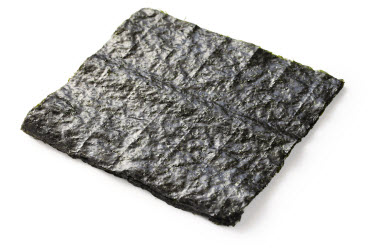
Nori is a staple food item in many Asian diets - especially the Japanese. It also is a prominent contributor in answering the "Is Sushi Healthy" question.
With a population of only 125 million, the Japanese manufacture and consume up to 3 times more nori in volume than do the Chinese who have a population over 10 times as large at around 1.3 billion.
Pretty safe to assume that the average person in Japan consumes a lot more nori than the average person in China. And consumes more per person than any other country in the world probably.
But does this actually improve the health of the average Japanese person though?
Let's take a look.
Nori is very rich in minerals and vitamins. Especially iodine. But it also contains B1, B2, B6, A, niacin, and C.
Compared to land plants, marine algae has as much as 10-20 times as much of these essential nutrients.
Nori is also helpful in curbing the formation of cholesterol deposits in the blood vessels. It is also very high in protein (up to 50 percent of its dry weight).
It is also a good source of glutamic acid, an amino acid and a neuro transmitter, which is important for memory and learning.
Does this contribute much to the overall health of the average Japanese person? I'm not sure yet...
But one thing that stands out that cannot ignored is this ---

Is it because of the Nori? Maybe.
Definitely something to think about, don't you think?
And there actually may be a connection between the low obesity rate in Japan and their large per person consumption of algae... take a look at this...
A study in 2010 found that algae can reduce our fat absorption rate by almost 75 percent. This they found was due to an inhibitory effect caused by the algae on a digestive enzyme called lipase. This lipase actually catalyzes the breakdown of fats.
And if that surprised you, check this out:

Are You Shocked? I was. I didn't see that one coming.
Can Seaweed reduce the risk of Cancer?
With all of the things we have discovered about nori and seaweed benefits already, is there anything else we don't know?
Well, there surely is more...
Seaweed may actually reduce abnormal cell growth by up to 95 percent.
Look at this study:

And a separate study:

There seems to be indisputable evidence pointing toward the health benefits of nori and all seaweeds in general and the positive benefits it provides in answering the "Is Sushi Healthy " question.
Ginger
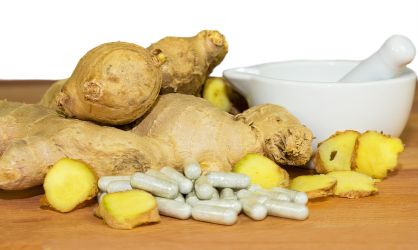 |
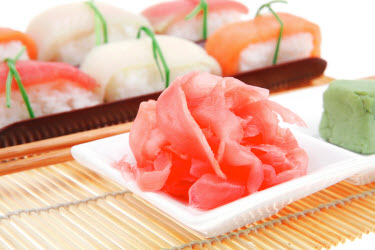 |
Ginger is often eaten after swallowing a piece of sushi in order to cleanse the pallet. I use it a lot in cooking and marinades too.
This is my “secret” ingredient in meatloaf and no one as of yet can figure out what the secret ingredient is. It is also excellent in making homemade teriyaki sauce.
But somewhat of another lesser known secret is that ginger is actually good for you and is another strong contributor in helping to answer the "is sushi healthy for you" question.
It has long been known and believed that ginger may help in many areas of general health from aiding digestion, to preventing skin cancer, to eliminating nausea.
Did you know that the Chinese prescribed ginger for digestive issues over 3,000 years ago? And the Ayurvedic tradition for centuries in Tibet and India treated inflammatory joint diseases using ginger including arthritis and rheumatism?
There is so much evidence that we should probably try to take it all in in bite sized pieces.
So, with that let’s start nibbling away at some of the health benefits of ginger.
Ginger and the Digestive System
You may have seen this headline before: Ginger aids with digestion.
And it looks like medical research is starting to catch up and is supporting this claim.
There looks to be 9 identified compounds in ginger that may bind to serotonin receptors influencing gastrointestinal function.
This can be due to the assistance of volatile oils (ginerols, zingerone, and shogoals) all of which are present in ginger. These oils increase the flow of fluid in the gastrointestinal tract.
Ginger also stimulates the production of saliva (which aids digestion), and may very well be the one of the best ways to insure the health of the gastrointestinal tract.
Ginger may help in Treating Nausea
Ginger has been found to be more effective than a placebo in treating nausea induced by seasickness, morning sickness and chemotherapy.
In it's comparison to drugs obtained over the counter for sea or motion sickness, it has been proven to provide better relief of its symptoms such as upset stomach, dizziness and cold sweats.
Other Studies with Ginger
If you still aren't impressed, here are a few more studies to consider:
- In 2010, Sciencedaily.com did a study and ginger was shown to reduce muscle pain due to exercise by as much as 25 percent;
- In mice, Ginger oil was shown to prevent skin cancer (Glorious Ginger: Root out ailments with this ancient spice);
- At the University of Michigan, a study proved that gingerols can kill ovarian cancer cells;
- In Denmark, trials showed that eating ginger on a regular basis brought relief in the swelling and pain associated with osteoarthritis and rheumoatoid arthritis sufferers and it also improved mobility;
- A study at Cornell University found that ginger reduces the ability of platelets to stick together, which can lead to blood clots;
- And another study of ginger root supplements by the Univ. of Health System, found a reduction of colon inflammation markers such as PGE2 showing that it may help prevent colon cancer
Still not convinced? Here's even more...
Folk Medicine and Ginger
Folk medicine has been utilizing the power of ginger for a lot longer than it has been used in modern medicine.
Traditionally called Jamaica ginger, it was used to treat constipation, indigestion, relief of gas, slow motility, and colic.
Ginger was also brewed for tea and used as a remedy for colds.
And...
- Ginger mixed with a sweetener from a palm tree root and boiled is used to create a mixture that is taken to prevent flu in Burma;
- In India, they relieve headaches by grounding ginger and applying it to the temples;
- It is used in an herbal mixture in Indonesia to relieve fatigue;
- In the United States ginger is used to relieve motion and morning sickness;
- In Japan, it is used to help with blood circulation
Does Ginger's contribution help answer the question, "Is Sushi Healthy for You?"
Definitely. And it is a big "Yes". Ginger's use has been documented for its use in treating ailments for thousands of years by cultures all over the world. Now, modern medicine is starting to catch up and believe it too.
Wasabi
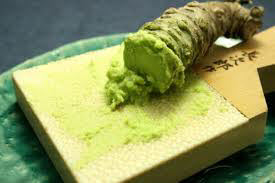
Is sushi healthy because of the use of wasabi?
Well, I think we will soon find out that it definitely doesn't hurt.
It too, like ginger, stimulates saliva production and helps with digestion.
There are compounds called glucosinolates which are converted by enzymes into ITC's (isothiocyanates) by the presence of water which is created when it is torn apart by chewing it or being ground up.
Current research shows that wasabi may help control allergies and asthma. It might also help prevent platelet aggregation (which causes blood clotting). There also may be applications in the treatment of heart attack and work against cancer cells because of the ITC's.
It looks like ginger and wasabi together could very well be an effective super root one-two punch for almost anything that ails you.
Is Sushi Healthy for You because of Sushi Grade Fish?
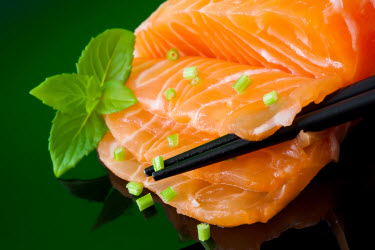 |
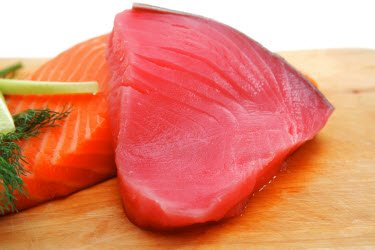 |
I don’t even know if we need to go over this one.
Most everyone has already heard about the benefits of eating fish versus other kinds of meat, but especially red meat.
A serving size portion of fish can supply up to 1/2 of the protein we require daily.
Most fish is also low in calories.
Most lean fish such as flounder, cod, sea bass, red snapper and sole contain 100 calories or less per 3 1/2 ounce portions. Fattier fish like mackerel, herring, and salmon contain around 200 calories.
Oily fish like Tuna, Salmon, lake trout, herring, and sardines are rich in Omega-3 fatty acids which has been shown to be pretty effective in preventing stroke, arthritis and heart disease.
Tilapia and catfish aren't as heart healthy because they contain higher levels of unhealthy fatty acids. Also be aware that the way the fish is cooked (broiling or baking versus deep frying) can have a huge impact on whether it is good for you or not. Deep frying can make an otherwise healthy fish - very unhealthy.
Of course, the cool part about this is that in most cases with sushi, fish is eaten in its raw state - which is as natural and healthy as you can consume it.
The Mayo clinic has stated that eating just 2 servings of fish per week (the size of deck of playing cards per serving), can reduce your risk of dying of a heart attack. Especially if it is a fish like tuna or salmon that is high in Omega-3’s.
Fish is eaten practically every day by almost every person in Japan. Partly because of this, heart disease and stroke is virtually unknown compared to the U.S. In Japan, deaths caused by heart disease is around 30 in 100,000. And in the U.S.? It is a whopping 106 per 100,000. Over 3 times higher.
And Omega-3 fatty acids are the stars of this show. Omega-3 is a type of unsaturated fatty acid that may reduce inflammation throughout the body. Inflammation in the body can damage your blood vessels and lead to heart disease. They may also decrease triglycerides, lower blood pressure, reduce blood clotting, decrease stroke and heart failure risk, reduce irregular heartbeats, and in children may improve learning ability.
Most seafood and fish also tend to be high in vitamin B12. B12 is essential for building and maintaining cells and iodine which is needed for good thyroid function.
It seems to me that sushi grade fish is a very strong contributor to answering the question, "Is Sushi Healthy for You?"...
Vegetables
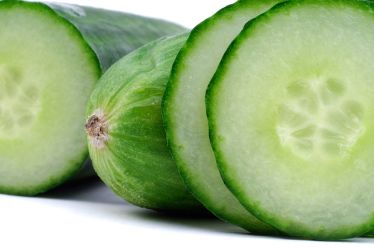
There are all kinds of vegetables that are used in making sushi. A few include cucumbers, carrots, kampyo gourd strips, and spinach. Nori is an algae but is considered a sea vegetable so it is included here also.
Vegetables are high in fiber and contain an abundance of vitamins and minerals. In cultures where a lot of fruits and vegetables are consumed, there are lower incidents of cancer.
Plants also protect the body from heart disease, cancer, diabetes and high blood pressure because they contain phytochemicals. There are several major groups of phytochemicals. Pholyphenols act as antioxidants which are thought to rid the body of free radicals - which can cause cancer and disease. Another is carotenoids (carrots, yams, cantelopes, etc.), which are promoted as anti-cancer agents.
One of the best things about the vegetables that are used in sushi is that most of the time they are used in their natural raw state.
Cucumbers, avocado, and carrots are usually sliced up and used raw. If they are cooked at all, normally they are only blanched. Spinach if used, is normally blanched.
This means that most vegetables that are used in sushi retain as many of the vitamins and minerals as possible because they are not cooked to death before being consumed.
Example...
I grew up in the south... Have you ever had turnip greens? or fried corn? or fried green tomatoes? or fried okra? (see a pattern here?) Vegetables in the south are not typically blanched... or served raw... but in sushi? They are.
So. Is Sushi Healthy for You? Well, the vegetables surely are...
Green Tea
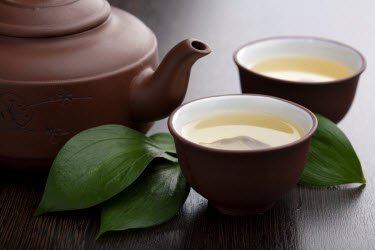
Green tea may not be officially an "ingredient" used to make sushi, but it is at the table of pretty much every sushi meal I have ever had so I think it at least deserves a mention.
Is sushi healthy because you drink green tea with it? It certainly won't take anything away from it.
It has been touted by almost every culture that consumes tea for hundreds, if not thousands of years for it's ability to eradicate illnesses from simple bacterial and viral infections to it's ability to help prevent stroke, heart disease and cancer.
Pretty tall order to live up to and the bar has certainly been set high.
But are the claims true though?
Can science back up any of these claims?
That's what we intend to try to try to find out.
But first, let's talk about green tea from a historical perspective. What our predecessors and ancestors have been saying about it.
Green Tea - From a Historical Perspective
In Chinese history, the health effects of tea are mention in a 4700 year old Chinese document called "The Divine Farmer's herb root classic". It was written by Shennong, the man known to be China's father of medicine.
In the document he talks about treating ailments such as lethargy, tumors, and abscesses using green tea... or Camellia Sinensis.
In today's Chinese culture, it is said to be most beneficial to consume it daily and is one of China's most prized herbs.
Here is a list of some folk remedies practiced by both the Japanese and the Chinese.
Holistic and Folk Remedies using Green Tea
- Strong tea is good disinfectant on cuts or bruises
- Strong tea can be used to relieve athlete's foot
- Chewing hydrated tea leaves cleanses the breath
- Washing face with tea reduces pimples and rashes
- Rinsing hair with strong tea adds shine/softness
- Re-hydrated tea leaves relieves toothache when pressed to tooth
- Cool/heal sunburns by soaking a towel in cold green tea and placing it on the burn
- Stops thirst
- Stimulates appetite
- Improves digestion
- Is an effective diuretic
- Relieves itching and swelling
- Removes phlegm
- Reduces fat & high cholesterol
That's not an all inclusive list, but you get the idea.
So, What does Modern Medicine have to say about Green Tea?
Camellia Sinensis is where all 3 types of tea come from - oolong, green and black. What makes them different is in the way they are processed.
- Green tea is made using unfermented leaves. These also happen to have the most antioxidants.
- Black tea is made from fully fermented tea leaves that involves withering and then rolling the tea leaves and then fermenting them for a long period of time.
- Oolong tea is made from the buds, stems, and leaves of the tea plant but is only partially fermented.
No matter how they are processed, they all 3 do contain varying levels of antioxidants in them.
Antioxidants stand in our corner and act as our "Rocky" in the fight against cancer. They are the ones that actually fight the free radicals for us. Free radicals are the damaging compounds that destroy DNA, modify cells and can cause cell death.
Scientists believe that these free radicals are the cause of heart disease, cancer and are what cause the aging process.
The polyphenols (antioxidants) that are in green tea can help to neutralize free radicals and may reduce or even eliminate the damage that they can cause.
This is what all of the excitement is about when it comes to green tea and also why it is being extensively tested by the scientific community.
High Cholesterol
High cholesterol is the leading cause of plaque buildup in the arteries. Left untreated and it will eventually lead to a stroke or a heart attack.
The good news is, green tea has been shown to be effective in lowering LDL (bad) cholesterol levels while also improving the LDL to HDL (good) cholesterol ratio.
Several studies have shown this. One study using animals showed that polyphenols may actually prevent cholesterol from being absorbed into the intestine. It may also help the body rid itself of cholesterol also.
This is something similar to what has been said about Nori or algae in general too, in that nori may help to "curb" the formation of cholesterol deposits in the arteries.
Still another study showed that green tea brought down the levels of "LDL" (bad cholesterol) in male smokers.
Cancer
In Japan where green tea is consumed by almost everybody, the incidence of cancer tends to be very low.
Now, there are obviously many other factors that have to be considered before this can be even partially attributed to green tea, but the ratio of those who get cancer in Japan versus say the U.S. are significant enough to warrant a closer look. Lifestyle differences between the two cultures are obviously different and the amount of green tea consumed by each is also vastly different; making green tea a potential candidate for the reason.
And in the last 10 years, medicine is starting to agree with these findings.
One interesting fact that supports this belief is that the National Cancer Institute has developed a plan for creating tea compounds for use in cancer chemo preventative agents in human trials.
There must be pretty strong evidence if the National Cancer Institute is utilizing it in some form for human trials.
Here's some more interesting facts to support this.
Studies in the laboratory of cell cultures are showing that polyphenols are strong triggers for cell suicide in cancer cells and also help keep them from dividing and replicating.
The antioxidant effects of catechins is assumed to be the reason for this. Specifically, EGCG or epigallocatechin-3-gallate.
In a 2004 issue of Mutation Research, EGCG's protective antioxidant effects was found to be 120% more effective than vitamin C against substances that caused cancer.
Green tea also can starve a cancer cell by inhibiting angiogenesis, which basically prevents the creation of new blood vessels.
More studies show that tea may be able to tell the cancer cell to self destruct by shutting off the genes that control cell growth - and this being done essentially by working at the genetic level.
While absolute definitive proof would be nice, there seems to be enough evidence showing that the benefits of green tea contributes much to the "Is Sushi Healthy" question.
Heart Disease
Recent studies have shown that green tea lowers triglyceride and cholestrol levels thereby reducing the risk of heart attacks.
This same study also estimated that drinking just 3 cups of green tea per day may reduce heart attack risk by 11% and drinking 5 or more cups per day increase that percentage to 16%.
The evidence was so significant that researchers came to the conclusion that:
"the more green tea patients consumed, the less likely they were to have coronary heart disease".
Sounds like they were pretty convinced...
Diabetes
There have been quite a few studies involving diabetes and the effects of drinking green tea if you have or are developing this condition .
One animal study showed that green tea may slow the progress of Type I diabetes and may actually help to prevent it.
Type I is where the body makes very little or no insulin. Insulin is used by the body to convert glucose into energy. If the glucose is not used and is allowed to build up, then a condition called hypoglycemia occurs. Hypoglycemia is where there is not enough sugar in your blood to be used as fuel for cells.
Early symptoms of hypoglycemia include:
- Dizziness
- Confusion
- Hunger
- Headaches
- Pale skin
- Irritability
- Trembling
- Anxiety
- Weakness
Left untreated, more severe symptoms may develop including:
- Poor concentration
- Headache
- Coma
- Nightmares
- Passing out
- Numbness in the mouth and tongue
- Poor coordination
- Irritability
Type 2 diabetes is a condition where the cells are not responding correctly to insulin which is known as insulin resistance.
Green tea may also help prevent Type 2 diabetes by improving glucose tolerance and insulin sensitivity.
In one study, diabetic rats were given green tea and at the end of 12 weeks their fasting levels of insulin, triglycerides and glucose were lower and their response to insulin had greatly increased.
In a second study, animals were given 3 different diets: a Japanese, a vegetarian and a western diet.
All 3 diets were supplemented with green tea and in all 3 blood sugar levels dropped; with the Japanese diet being the lowest. The Japanese diet also had the lowest cholesterol and triglycerides and the highest level of omega-3 fatty acids.
Researchers said that a Japanese diet and drinking green tea was an excellent way to prevent Type 2 diabetes.
Weight Loss
It has been found in clinical studies that green tea contains 3 substances (caffeine, theanine, and catechins) that promote weight loss. This being accomplished by boosting metabolism which in turn, helps to burn fat.
And not just any fat; but visceral fat. This is the type of fat that accumulates in the lining of the abdominal cavity and has been associated with Type 2 diabetes.
In a separate study by the American Journal of Clinical Nutrition, overweight men were given a bottle of green tea to drink every day for 12 weeks. At the end of the study, they all had a smaller waist circumference, lower BMI, and lower body weight than those studied who were given oolong tea.
So is Sushi Healthy for You if Green Tea is consumed with it?
It does look like even with or without sushi, green tea is a very good beverage to add into one's daily routine. I know that I try to have at least 3 servings of green tea everyday in hopes that it will make some kind of difference in the end :-)
Is Sushi Healthy for You?
...Health Busters...
- Some Condiments may not be very healthy. There are some condiments like mayonnaise that are used in some sushi. One that comes to mind is spicy tuna. If you are concerned about this, then opt for just a plain tuna roll.
- Some Food additions may not be very healthy. Take a Philadelphia roll for example. Nori-good. Sushi rice-good. Wasabi-good. Salmon-very good. Cucumber-very good. Cream Cheese?-Not so good... I have to admit it. I love the Philadelphia roll. But, if you are wanting to eat sushi that only has "good for you" ingredients in it, then the cream cheese just took this one off the healthy list. Look for things like that.
- Shrimp, Squid and some other seafood may be high in cholesterol. If you already have high cholesterol you may want to avoid these options or at least limit your intake.
- Watch the Soy Sauce. Soy sauce is typically high in salt. Instead use the light soy sauce.
- Be careful when ordering some Sushi... especially the fusion variety. What fusion basically implies is an incorporation of different cultures cooking methods and foods and/or experimental techniques. Unfortunately, what this means in the U.S. often times is the incorporation of some bad food habits that include things like deep frying. One in particular involves taking a perfectly healthy sushi roll, dipping it in tempura batter and then deep frying it. Not good...
If you are health conscious then just avoid these food choices and you should be left with some pretty "Is Sushi Healthy for You" - food choices that are an absolute - Yes!
So, What do You Think?
Is Sushi Healthy?
Well, I know I just asked you but since I can't hear your answer I'll throw in my two cents worth... (or add your comment to the end of this page and chime in!)
Honestly, overall I think sushi is a very healthy food as long as you try to stay away from the bad-for-you condiments, use lite soy sauce, stick more with the fish than with the high cholesterol shellfish and any kind of deep fried sushi.
Bascially try to stick more with the old school sushi. Like nigiri and plain maki rolls like tuna and salmon roll. You can also bump that up another notch by ordering brown rice instead of white rice with your sushi too, although I still think white rice is a healthy food choice.
In ending this discussion let’s try to put things into a little bit different perspective...
~~~
If every single American in this country would swap out a sushi meal for every fast food meal that they would otherwise be getting, then our...
Waistlines would probably shrink...
Our healthcare costs would probably plummet...
Our life spans would probably soar...
And the overall quality of our lives would probably dramatically improve...
What do YOU think?
~~~
Leave a comment below. It ain't all about me!
Put in your 2-cents worth!
Like this Page?
|
|
Follow me on Pinterest








New! Comments
Have your say about what you just read! Leave me a comment in the box below.